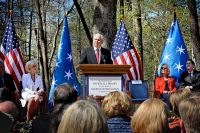MOUNT VERNON, Va., April 14, 2011 — Since the beginning of the republic, the United States has had to balance its idealistic impulses with realism, and that remains true today, Defense Secretary Robert M. Gates said here today.
Gates was the keynote speaker at the groundbreaking for the National Library for the Study of George Washington on the grounds of the Mount Vernon Estate.
Washington faced some of the same questions over the rise of revolutionary France that President Barack Obama faces with the revolutions in North Africa and the Middle East, Gates said. Washington became America’s first president in 1789, and he was confronted with the consequences of the French Revolution.
“The issue was whether to support the revolutionary government and its war against an alliance of European monarchies led by Great Britain,” Gates said. “To many, like Thomas Jefferson, the French Revolution, with its stated ideals of liberty, equality and fraternity, seemed a natural successor to our own.”
But many disagreed, including Vice President John Adams. “They were appalled by the revolution’s excesses and feared the spread of violent French radicalism to our shores,” the secretary said.
Washington had to resolve the matter. “My best wishes are irresistibly excited whensoever, in any country, I see an oppressed nation unfurl the banners of freedom,” he wrote. But the upheaval in Europe had begun to disrupt the U.S. economy, and he understood the fragility of America’s position at the time. He “adopted a neutrality policy toward France and would go on to make a peace treaty with Great Britain – sparking massive protests and accusations of selling out the spirit of 1776,” Gates said.
“Washington was confronting a question, a dilemma, that has been persistent throughout our history: how should we incorporate America’s democratic ideals and aspirations into our relations with the rest of the world?” the secretary said. “What Washington’s experience shows is that, from our earliest days, America’s leaders have struggled with ‘realistic’ versus ‘idealistic’ approaches to the international challenges facing us.”
The most successful American leaders steadfastly encouraged the spread of liberty, democracy, and human rights, Gates said. “At the same time, however, they have fashioned policies blending different approaches with different emphasis in different places and at different times,” he added.
The United States has made human rights the centerpiece of its national strategy, even as it was doing business with some of the worst violators of human rights, the secretary noted. “We have worked with authoritarian governments to advance our own security interests, even while urging them to reform,” he said. The world is witnessing an extraordinary story in the Middle East and North Africa, the secretary said.
“People across the region have come together to demand change, and in many cases, a more democratic, responsive government,” he said. “Yet many of the regimes affected have been longstanding, close allies of ours, ones we continue to work with as critical partners in the face of common security challenges like al-Qaida and Iran, even as we urge them to reform and respond to the needs of their people.”
A theme of American history is that the United States is compelled to defend its security and interests in ways that spread democratic values and institutions, Gates said. “When we discuss openly our desire for democratic values to take hold across the globe, we are describing a world that may be many years or decades off,” the secretary said. “Though achievement of the ideal may be limited by time, space, resources or human nature, we must not allow ourselves to discard or disparage the ideal itself.” America must speak about its values and ideals, Gates said.
“And when we look at the challenges facing contemporary fledgling democracies, or societies and governments facing pressures for change,” he added, “we would do well to be modestly mindful of the turbulence of our own early history and to remember our own long journey from a political system of, by, and for property-owning white men to an inclusive nation with an African-American president.”
Source:
U.S. Department of Defense
Office of the Assistant Secretary of Defense (Public Affairs)

 von
von 